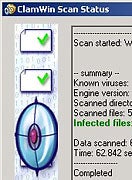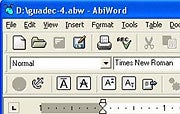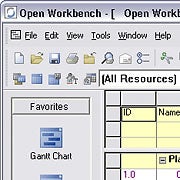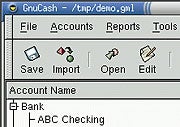Open Your Business to Open-Source Apps
Almost daily, headlines proclaim how businesses are cutting costs and improving productivity by using Linux-based, open-source software.
Almost daily, headlines proclaim how businesses are cutting costs and improving productivity by using Linux-based, open-source software. But open-source is more than just Linux: Plenty of free, open-source applications are available for Windows and ac OS X, as well.
Everyone is familiar with the Mozilla Firefox Web browser, and the audience for the OpenOffice.org office suite continues to grow, but those programs are only the tip of the iceberg. Presented here are just a few of the powerful open-source alternatives to major commercial software that can help keep your small business humming on a shoestring budget–provided you can handle a few rough edges.
Stamp Out Viruses
Antimalware software is so essential for today’s PCs that it’s virtually a usage tax on computing. Thankfully, you have one alternative for which you needn’t shell out a dime. ClamWincan spot viruses, Trojan horses, and spyware on any version of Windows, including Vista.

Based on the open-source ClamAV engine, ClamWin offers a detection database that includes almost 200,000 malware signatures and is kept current via automatic Web updates. On the downside, ClamWin has no real-time scanning capability–that is, it won’t automatically verify files when you load and save them. Instead, you have to scan files and folders manually, so you’ll need to be aware of potential virus risks and behaviors.
ClamWin also requires more manual intervention to remove suspicious files than most commercial antimalware packages do, but its scheduled scanning feature, combined with its helpful integration with the system tray and Explorer’s contextual menus, make it a viable option for most power users.
Serious Number-Crunching on a Budget
OpenOffice.org provides the most popular open-source spreadsheet application, but a lesser-known alternative called Gnumeric offers more-advanced features. As of the latest version, it’s now available for Windows 2000 and later, in addition to Linux.

Users report that Gnumeric is very fast, especially when handling large spreadsheets–sometimes even faster than Excel. It also offers better overall compatibility with Excel documents than OpenOffice.org does, but some popular Excel features, such as pivot tables, have yet to be implemented. On the plus side, scientists and mathematicians in particular will appreciate Gnumeric’s advanced, flexible plotting capabilities.
Perhaps Gnumeric’s biggest drawback, however, is that the Windows version is still very new. Downloading and installing it can be an arcane process, and Microsoft Office users might find the user interface less polished and user-friendly; people migrating from Excel will doubtless have to dig around and experiment to figure out how some of its features work. Still, if you’re looking for a mature, powerful spreadsheet application that won’t put a dent in your wallet, Gnumeric’s advantages definitely add up.
Document Creation for the Rest of Us
Adobe’s Portable Document Format (PDF) has become the de facto standard for document delivery in a variety of industries. For most folks, PDF authoring means installing lots of expensive and elaborate software. What they don’t realize, however, is that PDF is not a proprietary file format. It’s a published, open standard–and as a result, open-source software can come to the rescue.
PDFCreator is a lightweight alternative to Adobe Acrobat that makes basic PDF creation as simple as clicking a button. The program acts as an ordinary Windows printer driver, which means it can generate PDF files from any application that can print, and it even supports PDF encryption for secure documents.
What’s more, if PDF isn’t your bag, it can output to a number of other graphic file formats, including PNG, JPEG, BMP, TIFF, and EPS. Its documentation is a little scanty–the bane of too many open-source projects–but PDFCreator is so easy to use that you’ll hardly notice. One caveat: It doesn’t work on Vista.
Lean, Lightweight Word Processing
Over the years, word processing software has grown increasingly complex, to the point that Microsoft Word today includes countless features that most people will never use. AbiWord takes a different approach: At just 5MB to download, it aims to make the most out of a small, lean package.

The first thing you’ll notice is how much its interface resembles that of older versions of Word–and indeed, AbiWord fully supports the classic Word file format, in addition to HTML, RTF, WordPerfect, OpenDocument, and many others. (Currently, however, Word 2007’s .docx format is not supported.)
AbiWord is fast and responsive, and it has all the basic word processing features. Plug-ins provide still more capabilities, including Web-based dictionaries and translation, a grammar checker, and advanced equation editing for the mathematically minded. Murphy’s Law suggests that the one feature AbiWord lacks will be the one you need, but whether you run Windows or Mac OS X, you may be surprised at how much such a small program can do.
Professional-Caliber Page Layout
When you need to create documents more complex than a word processor can handle, it’s time to turn to a more-advanced page layout and desktop publishing application. Commercial packages routinely cost hundreds of dollars, but Scribus, a free download for Mac OS X and Windows, offers many of the same features.

Scribus’s advanced capabilities include full CMYK color management and support for ICC profiles, in addition to PDF support (including the ability to output press-ready PDFs). It also provides numerous professional-caliber typesetting features–and here, perhaps, is its greatest drawback. For users who lack a graphic design background, Scribus’s wealth of typographical and layout controls can be daunting. Worse, some seemingly simple tasks are implemented in a counterintuitive way; for example, when you add a large image to a graphic box on a page, it is automatically cropped, rather than scaled to fit.
If you know what you’re doing, there’s no denying that Scribus is powerful. Anyone who is looking for a quick, cheap alternative to Microsoft Publisher, on the other hand, would be well advised to look elsewhere.
Plan Projects for Peanuts
A lot of open-source projects are themselves loosely managed affairs, so it’s no surprise that project-planning software � la Microsoft Project isn’t high on many open-source developers’ priority lists. Open Workbench, however, provides many of the same features as the paid app does, and it’s completely free.

It began life as the product of a commercial software company, Niku, but spun off as an open-source project when Computer Associates acquired Niku in 2005. Open Workbench’s various features are similar to Microsoft Project’s (although CA would argue that its operating philosophy is fundamentally different). Plus, owing to its commercial origins, Open Workbench’s user interface is refreshingly polished for an open-source offering.
Where it falls short is in its upgrade path: Who knows if there even is one? The most recent version dates back to 2005, proof that its development community is virtually nonexistent. Worse, Open Workbench’s collaboration features function only if you buy an expensive server product from CA. Regardless, for a single user, Open Workbench is mature project-management software that gets the job done.
Instant Messaging Everywhere
Forget proprietary IM clients with their inconsistent interfaces and built-in advertising. Pidgin can keep you connected to all of the major IM networks at once, no strings attached. Though its user interface isn’t the prettiest, it allows you to connect and manage accounts with AIM, ICQ, MSN, and Yahoo, among others, and you can maintain a unified buddy list for all of them at once.
Because the developers of Pidgin don’t work directly with any of the big IM providers, the client occasionally has trouble connecting when the network protocols unexpectedly change, but that’s rare these days. Pidgin is mature software, and corrective fixes usually appear rapidly. Plus, its plug-in architecture allows third-party developers to deliver additional features, ranging from fun eye candy to strong encryption capabilities. Pidgin runs only on Linux and Windows, but a separate project, Adium, borrows from Pidgin’s code to provide the same capabilities on Mac OS X.
Small-Business Resource Management
Enterprise resource management (ERP) and customer relationship management (CRM) are software categories that you usually expect to be of interest only to large companies, but even small businesses can benefit from automated management of their customers and supplies. Compiere markets an open-source ERP and CRM package that has gained a respectable following among small-business owners as well as enterprises.
The program offers modules for accounting, order entry, customer management, sales-force automation, manufacturing, materials tracking, and more. Compiere is banking that its software is full-featured and complex enough that once you start using it you’ll be willing to pay for full service and support. Nevertheless, the Community Edition is fully open-source and available as a free download, so if you’re ready to make the leap away from spreadsheets and paper ledgers, why not take it for a spin?
Manage Your Money While You Save It
It’s not Quicken, but if you have some knowledge of accounting and are looking for finance management software that won’t break the bank, GnuCash may be for you. It runs on Linux, Windows, and Mac OS X, and handles accounting both for individuals and for small businesses.

Its more-advanced features include support for true double-entry accounting, as well as for small-business accounting with management of customers, vendors, and jobs. However, while GnuCash can import QIF and OFX files to allow migration from other accounting programs, it has only recently supported Windows, and the program’s UI may appear spare and even confusing to people who are familiar with more user-friendly, commercial alternatives.
For example, while GnuCash allows users to create a wide variety of custom reports, doing so requires knowledge of the somewhat-unusual programming language Scheme. Ultimately, if all you want to do is balance your checkbook, this software is probably overkill. But if you have complex accounting needs, GnuCash could be the serious financial software you’re looking for.
Neil McAllister is a San Francisco-based freelance writer who covers open-source and business computing.
Almost daily, headlines proclaim how businesses are cutting costs and improving productivity by using Linux-based, open-source software. But open-source is more than just Linux: Plenty of free, open-source applications are available for Windows and ac OS X, as well.
Everyone is familiar with the Mozilla Firefox Web browser, and the audience for the OpenOffice.org office suite continues to grow, but those programs are only the tip of the iceberg. Presented here are just a few of the powerful open-source alternatives to major commercial software that can help keep your small business humming on a shoestring budget–provided you can handle a few rough edges.
Stamp Out Viruses
Antimalware software is so essential for today’s PCs that it’s virtually a usage tax on computing. Thankfully, you have one alternative for which you needn’t shell out a dime. ClamWincan spot viruses, Trojan horses, and spyware on any version of Windows, including Vista.





